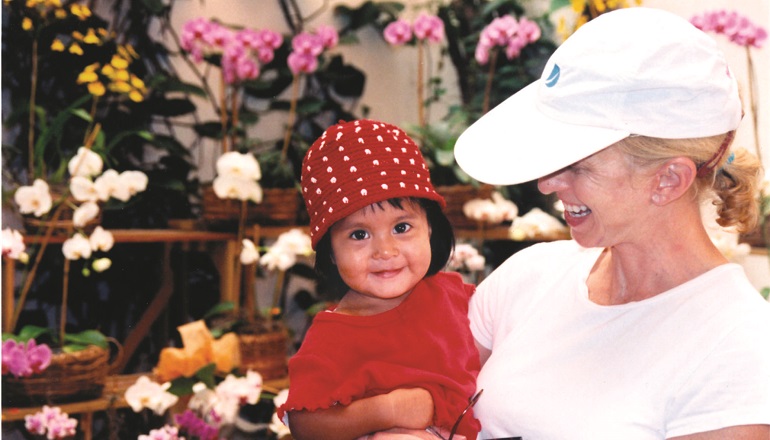Two ladies sit behind a table full of oil paintings of Spanish conquistadors and blue-eyed Madonnas, in their usual spot in the Fuente Café courtyard. Their legs are crossed at the ankles, black support-hose rolled down around their knees. A cigar box full of money sits between them.
I pass them on my way to Conexion, the Internet place where I obsessively check my e-mail and log onto chat boards to see if theres any news that affects the status of Guatemalan adoptions or our case in particular. Afterward, the ladies watch as my daughter, Olivia, crawls around the fountain and I leave another voicemail for the facilitator, who is supposed to be helping us finalize our case and get our daughter out of here.
I’ve been living in Antigua, Guatemala, since August, when Olivia turned 14 months old, and still wasn’t walking. In two weeks it will be Christmas.
The Señoras
“Buenos días,” señoras, I say brightly, as I run after Olivia, who has broken away from me and is toddling uncertainly toward them.
“Buenas,” they respond tartly, and the younger one, with the brown wavy hair, leans over the table for a better look.
“Está cansada?” she asks me, her voice dropping to a whisper of concern, her hand on her throat. “Is she tired?”
“Tal vez un poquito,” I answer. “Maybe a little.” Olivia is not the greatest sleeper, I admit.
The other lady, the older one with iron-gray curls, who is clearly in charge of the cigar box, reaches over to touch Olivia’s hand.
“Tiene frío!” she exclaims accusingly. “She’s cold.” She shivers dramatically. “Helado!” In Spanish, helado means ice cream, and can also mean frozen—which, I assure you, my daughter’s hand was not. Mildly chilly, maybe. But frozen?
Advice for the Taking
I’m used to it by now, the constant criticism of my mothering skills. To hear the women of Guatemala tell it, if my daughter isn’t tired, cold, and hungry, she’s hot and thirsty. While they would never dream of telling me that I speak Spanish badly, for example, or that my hair is a fright—both true, by the way—they don’t hesitate to comment that my daughter’s shoes are too small, her nails are too long, or she isn’t talking enough.
“Your baby is sick because you feed her too many eggs,” a waitress told me on one of my first mornings in Antigua. The waitress was in her sixties, with a long, thick braid that reached almost to her waist.
“But she likes eggs,” I tried to explain, mopping up the regurgitated mess from Olivia’s bib and high chair. Her foster mother told me.
The waitress clucked her tongue and wagged an accusing finger. “Huevos para los niños? No, no, no.” She tossed her head and shook her braid for emphasis.
“But her foster mother’s Guatemalteca,” I said, digging through my diaper bag. “She definitely told me Olivia likes eggs. Olivia lived with her for 14 months,” I added.
The waitress paused, temporarily stumped. The foster mother, a fellow Guatemalteca, in charge for 14 months, had said the baby liked eggs? Very well, then: “Sólo un huevo!” the waitress harrumphed. “Only one egg!”
Our housekeeper, Paola, admonishes me daily because I take Olivia outside. Guatemalans, according to her, keep children, safely and sanitarily, indoors, away from the unvaccinated masses. She makes it sound as if taking a toddler a la calle is tantamount to exposing her to a germ-riddled Petri dish. Although, now that she mentions it, Olivia does sniffle a lot. And forget about letting Olivia develop her small motor skills by feeding herself: Paola says Guatemalan mothers spoon-feed their children until they are three years old.
The Noblest Calling
Shortly before Christmas Eve, I finally get the call we’ve been waiting for. Our case has been released from the Guatemalan courts, the birth mother has signed off for the fourth and final time, and Olivia is officially ours. We still need to navigate the U.S. Embassy, but I know I can handle it.
My husband is due to arrive from California tomorrow, so it’s the last morning for just the two of us, Olivia and me, at the Fuente Café. Im so overjoyed by the news, I have to sit down on the grass, my head in my hands, and cry. Olivia takes this opportunity to run—literally, run—away from me and head straight for the table of the two señoras.
“Está corriendo!” the lady with the brown wavy hair exclaims. “She’s running!”
“Mira, mira!” the older lady with the iron-gray curls laughs. “Look, look!”
I scramble up from the ground and run after her. “We’re out! We’re out!” I scream joyously. “We’re going home!”
The two ladies look up at me and I see tears glistening in their eyes. “Eres una mamá muy buena,” the older lady says to me finally, using the familiar form. In this country where mothering children is considered life’s noblest calling, there is no higher praise. She reaches for my hand and squeezes it tightly.
“I’m trying my best,” I answer. And I am.



